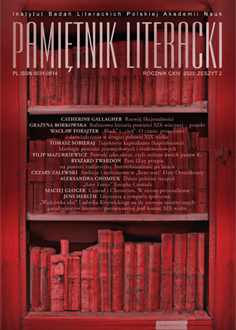The Rise of Fictionality
Rozwój fikcjonalności
Author(s): Catherine GallagherContributor(s): Tomasz P. Górski (Translator)
Subject(s): Language and Literature Studies, Studies of Literature
Published by: Instytut Badań Literackich Polskiej Akademii Nauk
Keywords: fictionality; referentiality; suspension of disbelief; emotional effect; proper names; Robinson Crusoe; Joseph Andrews
Summary/Abstract: Gallagher’s focus of interest in the paper is fictionality in the novel – the issue that has been troubling scholars and novel writers from the moment the first narratives were issued and the novelistic form took its shape as a literary genre. Referring to examples from various literatures (mainly American, but also English, French, and Russian), the researcher traces the modes in which narration was conceived, examines the changing concept of referentiality, scrutinises the various approaches to the (in)credible, falsehood, imaginary events, and proper names in a fictional composition. Since her observations in majority are reader-oriented, she refers to the concept of emotional effect and the suspension of disbelief (in Samuel Coleridge’s view) to observe the relationship between the fictional character and the public. Gallagher convincingly proves that the development of 18th-century literature mirrors a rise of fictionality since readers of that time became increasingly familiarised with the notion of fiction that is non-referential and detached from real-world figures, places, and circumstances.
Journal: Pamiętnik Literacki. Czasopismo kwartalne poświęcone historii i krytyce literatury polskiej
- Issue Year: 114/2023
- Issue No: 2
- Page Range: 5-28
- Page Count: 24
- Language: Polish

